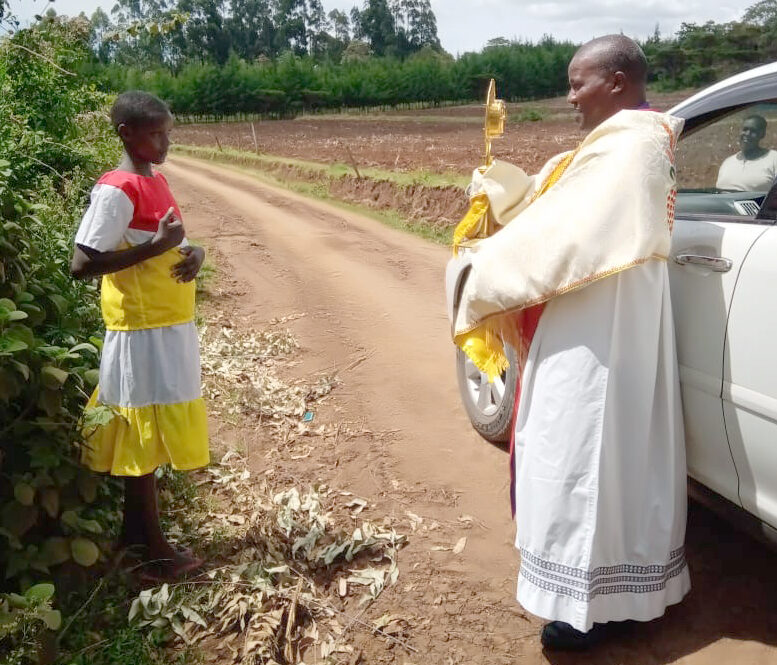Not too long ago, we spent a “Year of Mercy” brushing up on and practicing the corporal works of mercy. They come naturally to us. We are corporeal, enfleshed, so we naturally take care of the flesh. Still, there is no easy solution to the human needs they represent. Accomplishing them is difficult and often requires some level of suffering.

Diocese blesses a young girl on Corpus Christi during
Covid-19 lockdowns in Kenya.
Corporal Works of Mercy
• To feed the hungry
• To give drink to the thirsty
• To clothe the naked
• To shelter the homeless
• To visit the sick
• To ransom the captive
• To bury the dead
Parents engage in the corporal works of mercy all the time.
For example, to ransom the captive: It is a mere act of will to send a child who has done something wrong into a timeout. Mom says, “Go to your room.” Easily done, at least for a child with a developing conscience. But, going into the room with the child and helping him overcome his inclination toward the bad behavior with self-control, that’s hard. Imagine doing that for someone who has been caught in a serious crime. That would be difficult and would often require some level of suffering. But it can be done, even with a mere humanitarian set of skills. So, let’s ratchet it up a little.
Our world is fragile; it easily falls into chaos and needs assistance. The Year of Our Lord 2020 is wrought with such challenges, from the arrival of a new pandemic to the surfacing of ancient tensions in the human struggle for freedom and power. Into this global scene comes the healer of souls, Jesus Christ, who said, “The Son of Man came not to be served but to serve.”
To the ever new and ever ancient pitfalls of humanity, He has bound the glory of His divinity. Now the bar is raised for all His brothers and sisters. Corporal works of mercy alone no longer suffice. Instead, we must also tackle the prospect of doing the spiritual works of mercy.

Spiritual Works of Mercy
• To instruct the ignorant
• To counsel the doubtful
• To admonish sinners
• To bear wrongs patiently
• To forgive offenses willingly
• To comfort the afflicted
• To pray for the living and the dead
If the first list seemed difficult, the second will appear impossible. If the first often requires suffering, the second will demand long and patient endurance through frequent setbacks. While the first list of mercies might be received with gratitude, our fallen nature is more likely to receive attempts at the second list as anything but merciful. Instead, they may be considered intrusive and judgmental, or worse, they could be countered with defensive acts of self-preservation. “Who are you to judge me?” For this reason, we tend to shy away from them. But that is also dangerous. Not even attempting spiritual works of mercy is how neglecting corporal works of mercy can become systemic. We are embodied spirits and need to be nourished with every kind of mercy. Then, when we need them most, God calls and sends forth missionaries to heal and preach, to build and teach.
Laborers in the field of the Lord, of course, cannot practice mercy among God’s people alone. He sends us with them, who are familiar with our own attempts at mercy. From what resources God has provided us, we share and fortify them for the mission. God stirs our hearts and we offer prayer and support. Through the Mission Co-op Program in the summer, parishes respond to the personal appeals of God’s laborers. Through the Missionary Childhood Association, the sacrifices of children are gathered and sent to children most in need around the world. Through October’s World Mission Sunday, collections are taken up so we can pay God’s mercies forward for the benefit of His kingdom.
In 2020, if our lives have been inconvenienced, turned upside down or severely impoverished, we can only imagine what COVID-19 has done to those who had nothing to begin with. If we feel judgment or anger because of the actions of another, imagine the world we would know if we could act on those feelings with compassion and acts of mercy. Taking deeply to heart Pope Francis’ acknowledgment of suffering and Bishop Callahan’s call to prayer in the Year of St. Joseph, we will indeed be far from despair. Instead, we will be like St. Joseph, happily obedient to God for the good of all. St. Joseph is indeed a patron for the universal Church and a powerful intercessor in her divine mandate to go out to all the world and proclaim the Good News. May God bless you as you pray for the missions and do what you can to support.
From THE LITANY OF ST. JOSEPH
St. Joseph, pray for us. Patron of the Universal Church, pray for us. Spouse of the Mother of God, pray for us. Pillar of Families, pray for us. Model of Workers, pray for us. Comfort of the Afflicted, pray for us. Hope of the Sick, pray for us. Patron of the Dying, pray for us. Terror of Demons, pray for us.
By Father Woodrow Pace, Director of the Office for Missions
Published September/October 2020 Catholic Life issue

